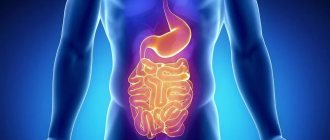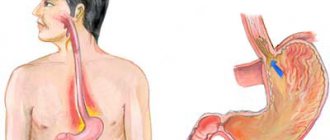Causes of stomach discomfort and constant gas formation
When consuming an increased amount of food, the walls of the stomach are stretched. Gastric juice, in turn, does not have time to process food, which leads to stagnation in the gastrointestinal tract. Patients may complain of heaviness in the intestines, belching and flatulence appear.
Factors that cause the above-described symptoms in the gastrointestinal tract:
- binge eating;
- abuse of fatty and fried foods;
- rapid swallowing of food;
- frequent snacking;
- constant consumption of sweet, carbonated drinks.
Heaviness in the gastrointestinal tract on an empty stomach can occur:
- during pregnancy, the uterus compresses the internal organs, causing discomfort;
- in a state of stress, hydrochloric acid is produced, which negatively affects the intestinal mucosa;
- bad habits such as alcohol and smoking have a negative impact on the functioning of all organs, including the gastrointestinal tract;
- taking antibiotics and certain medications.
If you have indigestion, you need to follow these rules:
- do not eat fatty, fried foods and processed foods;
- do not eat too hot or cold food;
- to refuse from bad habits;
- eat right and follow a special diet;
- give up all carbonated drinks.
The accumulation of gases in the gastrointestinal tract (flatulence) occurs due to dysfunctional digestion, which may be accompanied by belching. Typically, such symptoms do not require special treatment. But if flatulence, belching and bloating appear more and more often and are accompanied by diarrhea, you should consult a specialist as soon as possible. The reason for frequent belching is conversation during meals, haste in eating, eating on the go, as a result of which air gets inside along with food.
Diet
To prevent heaviness in the stomach and unpleasant belching, you first need to make changes to your lifestyle and adjust your diet. The number of meals should be increased, but the portions of the dishes should be small. The method of preparation is also important in nutrition; it is better to avoid fried foods, replacing them with stewing or steaming. If after some product or dish there is a feeling of heaviness in the stomach or belching with heartburn, then it is better not to consume it in the future.
When following a diet, it is important to adhere to the following rules:
- All food consumed should be at a comfortable temperature;
- Do not get carried away with fast food products;
- Do not eat on the go or quickly;
- While eating, food should be chewed thoroughly;
- To improve digestion, it is recommended to drink 200 ml of water 30 minutes before meals;
- Reduce the amount of hot sauces, seasonings, and mayonnaise consumed;
- Completely eliminate the consumption of alcoholic beverages, alcohol, strong tea and coffee.
It is better to eat simple natural foods that are not subject to lengthy or complex processing. It will be good if it is not canned food, as well as food without the addition of artificial colors and flavor enhancers. Compliance with these simple requirements will greatly improve the condition of the digestive system, make its organs healthier and relieve belching, pain and discomfort in the stomach.
List and brief description of gastrointestinal diseases
The appearance of belching along with flatulence and heaviness often signals serious abnormalities in the human body.
- Gastritis. When it occurs, increased or insufficient secretion of gastric juice occurs, the mucous membrane becomes inflamed. Often the cause of the disease is the following factors: alcoholism and smoking, poor diet, constant stress.
- Stomach ulcer. A chronic disease in which abscesses form on the gastric mucosa. This disease is characterized by severity, heartburn, vomiting, severe pain and can lead to complications.
- Dysbacteriosis. Violation of the beneficial composition of the intestinal microflora, resulting in a malfunction of the stomach. In this case, the patient experiences frequent rumbling, bloating, and changes in stool.
- Pancreatitis. Inflammation of the pancreas occurs. The following symptoms are characteristic of pancreatitis: nausea, vomiting, severe pain in the left or right hypochondrium, general weakness.
- Cholecystitis. Inflammation of the walls of the gallbladder and disruption of its functions. This organ takes part in the digestion of food. During the period of exacerbation of chronic cholecystitis, symptoms such as belching, vomiting of bile, abnormal bowel movements, bitter taste in the mouth, and pain on the right side occur.
Treatment
To eliminate such unpleasant symptoms as belching and a feeling of heaviness in the stomach, it is necessary to determine their cause. Based on the diagnosis, a plan for further treatment is drawn up; in some cases, it will be sufficient to establish proper nutrition. If this is not enough, you will have to seek medical help. After the examination and laboratory tests, the diagnosis and necessary prescriptions will be determined.
- If a healthy person exhibits similar symptoms, the causes of which are suspected of consuming low-quality products, then you can eliminate them yourself by taking two tablets of activated carbon.
- For prolonged symptoms of discomfort and heaviness in the stomach, you can take drugs that facilitate digestion in the form of Mezim or Festal;
- You can try to eliminate unpleasant symptoms with a warm heating pad or light self-massage.
- To improve the functioning of the stomach, experts recommend doing therapeutic exercises in the form of bending the torso and twisting it in both directions.
If, apart from heaviness in the stomach and belching, there are no other manifestations of more serious diseases, you can try using folk recipes to normalize the functioning of the digestive system.
Diagnosis of diseases
Firstly, it is necessary to establish the cause of the unpleasant symptoms, because they may indicate the presence of serious problems in the gastrointestinal tract. Secondly, if the examination does not reveal any pathologies, you need to first understand your lifestyle.
Eliminate all bad habits, change your diet, start eating a healthy diet and chew your food slowly. It is also not recommended to overeat at night and the last meal should be two or three hours before bedtime.
In what cases should you seek help from a doctor? If symptoms such as heaviness in the stomach, belching of air, constant gases and flatulence bother you for long days, you should consult a specialist. He will explain what it could be. During the examination, the gastroenterologist will refer you to the examinations he has prescribed. It could be:
- general and biochemical blood test,
- fibrogastroscopy,
- Ultrasound of the gastrointestinal tract.
You should learn to control your emotions and not succumb to stressful situations, as they will negatively affect not only the functioning of the heart and blood vessels, but also the functioning of the entire intestine.
After meal
Harmless belching after eating is not a symptom of serious illness, however, these manifestations indicate the need to reconsider your diet or change something in your usual lifestyle. Most often, belching after eating occurs due to overeating, which has a very negative effect on the digestive processes. It is difficult for the stomach to cope with the large volume of food that has entered it, the digestion process slows down, and food stays in it longer than usual, where the processes of fermentation and putrefaction occur, leading to belching. At the same time, the stomach itself suffers, as its walls are stretched and deformed. The method of dealing with such disorders is to change the size of food portions. If, as a result of reducing the volume of dishes, belching and heaviness in the stomach disappear, then there are no other reasons causing symptoms of discomfort.
Another reason for belching that occurs after eating is fatty and spicy foods, as well as dishes prepared by frying. To digest it, the stomach has to secrete more enzymes, which, when the food is broken down, release a large amount of gases that exit through the esophagus in the form of belching. Such dishes not only cause belching, but also create a feeling of heaviness in the stomach.
Failure to comply with the drinking regime can lead to unpleasant symptoms in the stomach in the form of heaviness and belching. The liquid must be consumed at a certain time and in the quantities necessary for the body. It is not recommended to drink liquids with food, so as not to dilute the gastric juice. This should be done only an hour before meals or 30 minutes after that.
Carbonated drinks will definitely cause belching, especially if you drink them with a large meal.
The habit of snacking quickly while on the run often ends in indigestion, heaviness and belching. When food is not chewed enough, as well as when air is swallowed along with it during movement, the digestive processes occur with disturbances.
Medicines for the treatment of heaviness and belching of the gastrointestinal tract
Treatment with medications is prescribed only by a doctor. Pharmacies today sell various drugs and medications to eliminate and treat problems with the digestive tract.
The following medications are considered the most famous and effective:
- Panzinorm. Used for dysfunction of the pancreas, as well as for flatulence and dyspepsia.
- Smecta. This medication is taken for various problems in the gastrointestinal tract, gastritis, ulcers, etc.
- Mezim. Designed to eliminate belching, heaviness and pain. The course of treatment is prescribed by a doctor.
- Festal. Helps with discomfort, heaviness, eliminates gases, constipation, improves digestion.
- Rennie. Prescribed for those who have high stomach acidity, heartburn and belching.
- Omez. Reduces the production of hydrochloric acid in the stomach and has antiulcer properties.
- Motilium. This drug is very popular among the population. It is taken for flatulence, nausea, vomiting, cholecystitis, and heartburn. It perfectly eliminates the feeling of heaviness in the stomach after eating.
When taking one of the above medications, you must first read the instructions. The choice of a method of dealing with gastrointestinal problems should first be carried out according to the principle of least harm to the body. First of all, normalize your lifestyle and diet, and if after this there is no improvement, resort to choosing suitable medications.
Reviews
Dear readers, your opinion is very important to us - therefore, we will be glad to hear your feedback about belching and heaviness in the stomach in the comments, this will also be useful to other users of the site.
Oleg: I was constantly tormented by heartburn, and recently an unpleasant belching began to occur, which was especially annoying in inappropriate conditions. After eating, I sometimes experience stomach pain, so I had to see a doctor. After the examination, the presence of gastritis was discovered, and in a chronic form. The doctor prescribed treatment and a diet, and it was adherence to the diet that brought more positive results. We managed to get rid of the belching and now it occurs very rarely.
Oksana: I started to suffer from belching after eating, as soon as I eat something spicy or fatty, I feel a heaviness in my stomach. The doctor prescribed Mezim, but warned me not to get carried away, it is better to limit the consumption of those foods that cause them to appear.
Valeria: when belching appears, the main thing is to exclude the possibility of serious illnesses that have the same symptoms. Otherwise, diseases can develop and you will have to undergo long and difficult treatment.
Causes of belching air on an empty stomach
An interesting reason for the reflux of air from the stomach and esophagus into the mouth is a number of neurotic conditions in which cardiospasm (involuntary contraction of the muscles of the lower parts of the esophagus or the inlet of the stomach) is observed in the program of gastrointestinal disorders. This is the so-called “empty belching” of air, not associated with food intake (against the background of swallowing air or aerophagia during deep nervous breathing through the mouth or deep sighs).
Patients are concerned about swallowing disorders with difficulty passing food in the lower parts of the esophagus. At the same time, unlike esophageal tumors, solid food passes through better, and liquids get stuck. There may be pain or a sensation of a lump behind the sternum. Pain or distension in the stomach, vomiting, nausea, and appetite disturbances also occur. Sometimes these signs transform into a full-blown clinical picture of irritable bowel syndrome.











